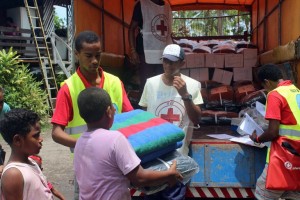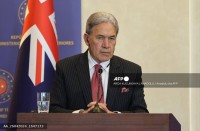
SUVA, Fiji (AFP) — Humanitarian aid was finally reaching isolated communities in Fiji devastated by super-cyclone Winston, officials said Friday, with the government estimating the damage bill will top hundreds of millions of dollars.
At least 44 people died when the most powerful storm in Fiji’s history hit on Saturday and the UN says about 50,000 — more than five percent of the entire population — have been left homeless.
Some of the worst-affected villages were on far-flung islands, complicating the relief effort, but the UN humanitarian agency OCHA said they were now receiving aid after days of waiting.
“Aid has begun arriving in cyclone-affected communities, especially the hard-hit outer islands and Rakiraki in the west (of the main island Viti Levu),” it said.
The agency added the challenge remained significant.
“Intermittent essential services, as well as poor road access and communications difficulties, remain a constraint for both assessments and the delivery of relief,” it said.
The cyclone lashed Fiji with gusts of 325 kilometres per hour (202 miles per hour) and Oxfam said the Pacific nation’s humanitarian needs were “huge and widespread”.
The charity’s Fiji chief Dolores Devesi said some settlements had been completely destroyed, leading to cramped evacuation centres where outbreaks of disease and diarrhoea were a danger.
“It’s very crowded, so there’s a risk that the toilets and water supplies won’t be adequate to cope with the number of people in the centres,” she said.
The government, which has declared a 30-day state of natural disaster, said the storm was a costly blow for Fiji.
“If you take into account the number of homes all over Fiji that have been damaged, demolished, (the) impact on agriculture… the impact on power lines, you can easily say it’s FJ$1.0 billion (US$470 million) so far,” Finance Minister Aiyaz Sayed-Khaiyum told reporters on Thursday.
Australia and New Zealand have so far led the international response, sending planes laden with supplies, helicopters and medevac teams.
New Zealand is also dispatching two naval ships this weekend, while France sent two military transports from New Caledonia.
In addition, there has been financial support from Australia, New Zealand, India, China, the United States, Japan, Nauru and the Asian Development Bank.
str/ns/mp/jah
© 1994-2016 Agence France-Presse







